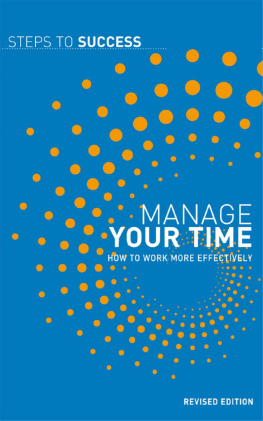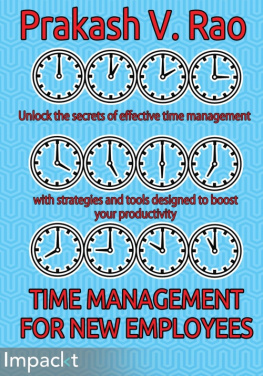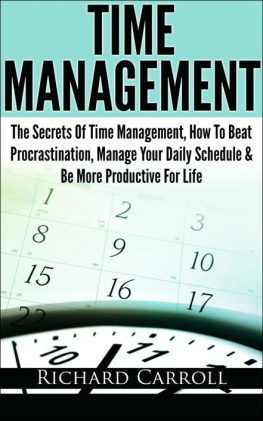3 Manuscripts in 1 Book, Including: How to Manage Time, How to Be Organized and How to Change Habits
More by Miles Toole
Discover all books from the Personal Productivity Series by Miles Toole at:
bit.ly/miles-toole
Book 1: How to Be Productive
Book 2: How to Manage Time
Book 3: How to Be Organized
Book 4: How to Stay Focused
Book 5: How to Set Goals
Book 6: How to Stop Procrastinating
Book 7: How to Change Habits
Book 8: How to Stay Motivated
Themed book bundles available at discounted prices:
bit.ly/miles-toole
Copyright
Copyright by Miles Toole. All rights reserved.
This document is geared towards providing exact and reliable information in regards to the topic and issue covered. The publication is sold with the idea that the publisher is not required to render accounting, officially permitted, or otherwise, qualified services. If advice is necessary, legal or professional, a practiced individual in the profession should be ordered.
From a Declaration of Principles which was accepted and approved equally by a Committee of the American Bar Association and a Committee of Publishers and Associations.
In no way is it legal to reproduce, duplicate, or transmit any part of this document in either electronic means or in printed format. Recording of this publication is strictly prohibited and any storage of this document is not allowed unless with written permission from the publisher. All rights reserved.
The information provided herein is stated to be truthful and consistent, in that any liability, in terms of inattention or otherwise, by any usage or abuse of any policies, processes, or directions contained within is the solitary and utter responsibility of the recipient reader. Under no circumstances will any legal responsibility or blame be held against the publisher for any reparation, damages, or monetary loss due to the information herein, either directly or indirectly.
Respective authors own all copyrights not held by the publisher.
The information herein is offered for informational purposes solely, and is universal as so. The presentation of the information is without contract or any type of guarantee assurance.
The trademarks that are used are without any consent, and the publication of the trademark is without permission or backing by the trademark owner. All trademarks and brands within this book are for clarifying purposes only and are the owned by the owners themselves, not affiliated with this document.
Table of Contents
Book 1: How to Manage Time
7 Easy Steps to Master Time Management, Project Planning, Prioritization, Delegation & Outsourcing
Miles Toole
Introduction
Welcome to How to Manage Time. Going through the following chapters is the first step in becoming more efficient in your work.
It seems that no matter what we do, or where we do it, there are moments when time seems to slip away from us. Whether at work or at home, time management is a vital element in feeling more accomplished in our lives, both personally and professionally.
Today, with our hectic and fast paced lives, there are so many resources that aim to help us make the most of our time. There are manuals and regimens, programs, and gadgets. But does it need to be so difficult? Does allocating blocks of time to certain tasks and activities really need to be so hard? The answer, despite common belief, is no. Making time for our tasks does not need to be as complicated as many make it out to be. With the right tools and attitude, anyone can get all their tasks done- with ample time to spare.
The following seven steps will condense these tools into a logical and easy to follow manner. These steps will help you to create a strategy so you can tackle your mismanagement problems head on. You will learn the ways in which you can plan and organize your tasks in a streamlined manner with easy to learn skills.
You will learn the importance of delegating and outsourcing work, the myth of multitasking, as well as learning the importance of saying no. Time management is something that affects all of us, every day, whether we are aware of it or not. That is why these steps will be easy to follow for anyone, regardless of what you are trying to accomplish.
As long as you are prepared to put in the effort, managing your time in an efficient way will come to you easily. Just follow these simple seven steps...
Chapter 1: Step 1 - Create a Strategy
There are moments when we look up and realize that weve wasted a whole day, or times when we are scrambling to finish a task right before its deadline. We frantically write to-do lists that never seem to end, or use reminders, alerts, and deadlines to keep ourselves on track. Yet it seems like we do all this to no avail; nothing seems to work. No matter how hard we try to change our ways, we always fall into our old habits, time, and time again. But why? What are we doing wrong? What is the secret to managing our time in a logical manner- in a way that will last. It all comes down to strategy.
We cannot solve an overarching problem if we tackle it from all angles. It may sound counter intuitive, but the key to better managing our time is recognizing where we are falling short and working on that specific area first .
The mismanagement of time affects every single person. Students, teachers, business owners, artists, everyone. And the reasons why we mismanage our time are just as numerous. Before you try to force yourself into a new schedule or regimen, you need to fully understand what needs to change about the existing method you currently have. A certain strategy that works for one person may not necessarily work for you. Your strategy and plan of action needs to be particular to your journey and goals.
You cannot expect to see positive results if you follow what everyone else is doing. Take the following information in a way that will be beneficial to you and your work. Know what tips and pieces of advice apply to you which do not. A personalized strategy will ensure that you are tackling this issue in a methodical and logical manner. There are a few ways to begin...
Ask Why
We all struggle with wasting time, to varying degrees. We need to understand where our time goes and how to gain better control over it. For some, distractions are a huge time waster. For others, laziness may be the culprit. Whatever it may be, there is a solution to the problem.
Even the most intelligent and capable person will be hindered by improper time management. We can do everything right yet never get where we want to be. We have to ensure that we are not only doing the right things, but doing them at the right time , with the right amount of time. So, ask yourself why? Why cant I accomplish all of my tasks?
Take a look at a typical workday and pay attention to where you spend your time. Either use a time tracking app or a schedule to easily track your activities. Every time you switch activities or tasks, jot it down. Every time you start or stop working, make a note of it. Even write all the times you procrastinate and linger.
Once this is complete, you will be able to see what you are doing right and what you are doing wrong. You may be spending inordinate amounts of time responding to emails, or hours talking on the phone. Maybe you spend a long time making breakfast, and not enough time eating it. Whatever the case may be, there will be findings previously unknown to you.












